
Immunotherapy has changed the face of cancer treatment, but requires appropriate irAE management to reach full potential.


Benefit-Risk Profile of Trastuzumab/Pertuzumab With FLOT Regimen Comes Into Question in HER2-positive Gastric Cancer

Immunotherapy has changed the face of cancer treatment, but requires appropriate irAE management to reach full potential.

After demonstrating significant efficacy as a third-line treatment for patients with metastatic HER2-positive breast cancer, fam-trastuzumab deruxtecan-nxki has gained approval from the FDA for 5 indications and is under investigation across solid tumors.

Olaparib is an oral drug manufactured in 150-mg and 100-mg tablets. Olaparib is taken by mouth, twice daily. It can be taken without or without food.

The combination of durvalumab and tremelimumab has been approved for patients with unresectable hepatocellular carcinoma. The combination comes with warnings for immune-related adverse events and infusion reactions.

HER2-directed antibody-drug conjugates (ADCs) play an important role in the treatment of breast and gastric cancer.

Selpercatinib demonstrated a promising efficacy profile in patients with RET-fusion positive solid tumors.
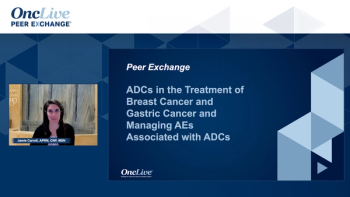
Shared practical advice on the management of toxicities associated with antibody drug conjugate therapy in both the breast cancer and GI cancer settings.
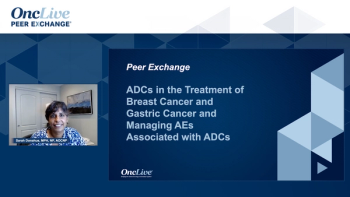
Before closing out their discussion on HER2+ gastric cancer, experts review clinical trials investigating other novel ADC agents in this setting.

Neoadjuvant chemotherapy allowed 79% of patients with early-stage I/IIA rectal cancer to pursue organ-sparing excision surgery, potentially preserving their quality of life and bowel function.

Structured preceptorships promote competence, confidence, and job satisfaction in new oncology nurse practitioners.

Derazantinib, an FGFR inhibitor, was associated with a median progression-free survival (PFS) of 7.8 months in patients with FGFR2-positive intrahepatic cholangiocarcinoma.
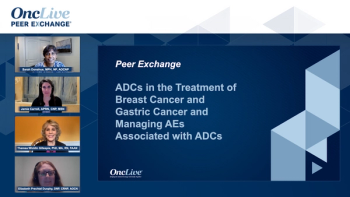
Panelists share their perspective on the role of the broader, multidisciplinary healthcare team in managing toxicity associated with trastuzumab deruxtecan therapy.
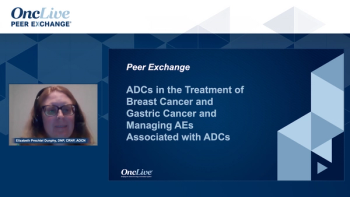
Comprehensive insight on the optimal management of diarrhea associated with ADC therapy, with regard to patient education and monitoring during treatment.

Futibatinib is now approved to treat patients with previously treated unresectable, locally advanced or metastatic intrahepatic cholangiocarcinoma. The agent comes with warnings for ocular toxicities, and hyperphosphatemia and soft tissue mineralization.

Kristin Barber, APRN, AOCNP, FNP-BC, unpacks the FDA approval of durvalumab in combination with cisplatin and gemcitabine for patients with biliary tract cancers.
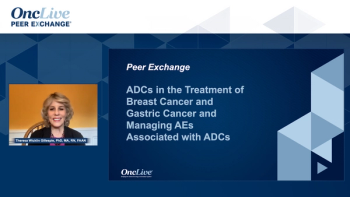
Shifting focus to the second patient profile of HER2+ gastric cancer, key opinion leaders highlight the risk and management of diarrhea in this setting.

Panelists briefly review ongoing clinical trials with trastuzumab deruxtecan in the setting of HER2+ gastric cancers.

Selpercatinib was approved by the FDA for RET fusion–positive non–small cell lung cancer and locally advanced or metastatic RET fusion–positive solid tumors.

Patients with hepatocellular carcinoma achieved a median overall survival of 15.9 months with tislelizumab and 14.1 months with sorafenib.

Focused discussion on the management of antibody drug conjugate–related adverse events in gastric cancer, with a focus on neutropenia.

A broad overview of the treatment armamentarium for patients receiving first- or second-line therapy for HER2+ gastric cancer.

After 10 months of follow-up, the confirmed objective response rate among patients with metastatic gastric cancer or gastroesophageal junction adenocarcinoma who received trastuzumab deruxtecan was 41.8%.

A multicentre, retrospective study showed that treatment-related adverse effects associated with atezolizumab plus bevacizumab were prognostic of improvements in survival outcomes in patients with hepatocellular carcinoma.

In this episode of “The Vitals,” Christine Miaskowski, PhD, RN, discusses research showcasing that adult patients receiving either a platinum-based chemotherapy, taxane alone, or a combined regimen of platinum- and taxane-based treatment may be at risk of hearing loss.

Patients with relapsed or refractory metastatic colorectal cancer who received dose-optimized regorafenib achieved superior survival outcomes than those who received best supportive care, fruquintinib, standard-dose regorafenib, and trifluridine/tipiracil.